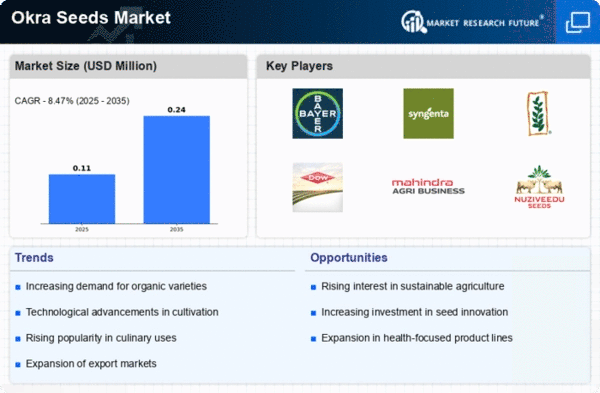Market Analysis
In-depth Analysis of Okra Seeds Market Industry Landscape
Private sector companies have emerged as key players in the production and distribution of seeds, contributing significantly to the agricultural landscapes of both developed and developing economies. This sector has witnessed remarkable growth in recent decades, driven by the forces of globalization in trade and advancements in biotechnology for plant breeding. The influence of private enterprises is evident across the spectrum, with multinational corporations, small-scale enterprises, and medium-sized companies establishing a robust presence, particularly in the developing regions of Asia-Pacific and Latin America.
A notable example illustrating the impact of private sector involvement is found in Colombia, where over 70% of certified vegetable seeds are produced by domestic companies. The Colombian government has recognized the pivotal role played by the private sector and has responded with policy changes aimed at fostering its growth. One significant shift has been the transition from compulsory regulations governing seed certification and variety releases to a more voluntary framework in Latin America. This adjustment not only reflects the adaptability of the regulatory environment but also encourages private sector participation and innovation.
Furthermore, Brazil stands out as a prime example of collaboration between private and state sectors in research and development (R&D). The Brazilian Agricultural Research Corporation (EMBRAPA) serves as a platform where both private enterprises and the state engage in collaborative efforts to advance agricultural research. This model of cooperation is instrumental in driving innovation and addressing challenges in the agriculture sector, ultimately benefiting farmers and contributing to global food security.
The partnership between the public and private sectors proves to be a strategic alliance for the efficient distribution of high-quality seeds, particularly to smallholder farmers. This collaborative approach directly aligns with global initiatives aimed at achieving food security targets. The involvement of private companies brings with it a level of agility and innovation that complements the efforts of the public sector. This synergy is crucial in ensuring that farmers, especially those in resource-limited settings, have access to a diverse range of quality seeds, which is fundamental for sustainable and productive agriculture.
The globalization of trade has facilitated the cross-border movement of seeds, allowing private companies to establish a presence in diverse markets. This has not only spurred economic growth in the seed industry but has also contributed to agricultural diversification and increased resilience in the face of evolving environmental and market conditions.


















Leave a Comment